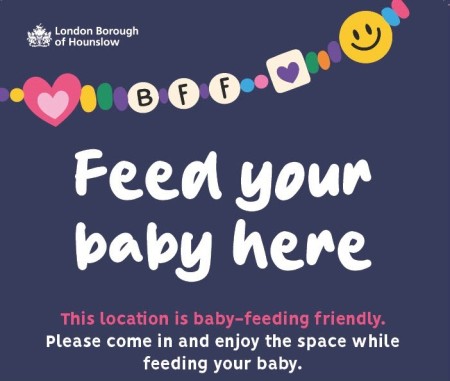In April 2022 it was identified that Hounslow had a 45% Breastfeeding rate, which was lower than the national average of 48.6% in Q4 of 21/22.
To better understand why Hounslow was below the national average, an Infant Feeding Survey was produced by the Hounslow Public Health Team, who followed the Populational Health Management Framework guidelines to help develop an evidenced based intervention. The survey aimed to gain greater insight from local mothers who had had a child between 2017-22.
840 Hounslow mothers completed the Infant Feeding Survey, which was conducted via text messages from Health Visitors, or face-to-face within Family Hubs and Children Centres throughout Summer 2022 (three-month period).
The survey evidenced younger mothers were significantly less likely to breastfeed, and additional barriers to breastfeeding also included:
- Little support to breastfeed from partners/ families or friends.
- Language barriers.
- Mothers may have high dependence elsewhere and need to share feeding responsibilities with other family members.
- Lower self-determination.
- Access to services.
During this period desktop research suggested that white women from low-income backgrounds were also less likely to breastfeed. This research indicated that babies may have worse outcomes due to health inequalities and may be more severely impacted by low breastfeeding rate.
What else did the evidence suggest:
Data from the infant feeding survey evidenced that mothers felt Hounslow as a borough wasn’t breastfeeding friendly and that the provision from Health Care Providers was lower than expected.
The survey enabled the project team to broadly collect mothers’ feedback, which highlighted that further qualitative research in a pilot area would produce clearer insights.
Informal interviews were carried out in a group setting, usually at a Baby TLC class at the REACH Children’s Hub in Feltham. This area was identified due to the high and growing population of young families; areas of deprivation and lower uptake of other health services and interventions within the area.
Qualitative anecdotal evidence from local mothers found that even though Feltham had a growing population of young families, the locality was not designed with babies and families in mind.
Developing a new intervention:
The research helped underpin the new Hounslow Baby Feeding Friendly (BFF) pilot locality project. This project looked to create a network of businesses in Feltham high street, along with Feltham Library and Alf King family hub to market themselves as baby feeding friendly locations, and advertise that mums are welcome to feed their babies there.

Since November 2023, three local Feltham businesses have joined the scheme and are marketing their BFF offer, and several have expressed interest. Continued promotion for new businesses is still on-going.
How will it be evaluated?
Feedback from families will be collected via QR codes displayed within Hounslow Baby Feeding Friendly premises. Regular contact will be made with participating businesses to assess if customer base has changed as a result of the scheme.